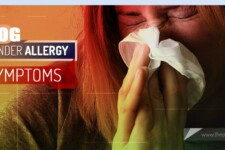Dog Food Allergy Symptoms (Prevention and Treatment)
The choice of dog food can have a significant effect on their health. This is true especially if your dog is allergic to certain foods.
Though not common, dog food allergies are attracting a lot of concern among dog parents as there’s an increasing number of dogs suffering from these allergies.
Like any other allergy, dog food allergy symptoms can exhibit mild to severe warning signs that can greatly affect your pooch’s health.
In this article we demystify what dog food allergy means, its symptoms, prevention and treatment as well as the popular dog food allergens.

Defining Dog Food Allergies
A Food allergy is not similar to food intolerance.
Although the two terms are used interchangeably sometimes because they exhibit similar symptoms, there`s a clear-cut distinction between the two.
Food intolerance is caused by poor food digestion and does not involve the immune system.
For example, if your dog is lactose intolerant, it means that your dog lacks or has low levels of milk digesting enzyme, lactase.
Therefore, their digestive system cannot process milk, resulting in gastrointestinal problems.
On the other hand, a dog allergy refers to an over-response of your dog`s immune system to an invading protein.
If your pooch ingests certain food proteins that they are allergic to, the allergen triggers an immune response that causes the body cells to release some compounds and histamines.
The released histamines in turn causes related allergic symptoms such as itching, watery eyes etc.
It should be noted that protein must be present in the food your dog eats.
Remember, proteins are not only sourced from meat and related meat products, but they`re also present in grains, fruits, and veggies.
Any of these protein sources can potentially trigger a food allergy in your dog.
Dog Food Allergy Symptoms
The manifestation of a dog food allergy may range from mild effects such as itching to dire health consequences such as loss of skin, and gastrointestinal problems.
Let`s have a look at some of the common food allergy symptoms in dogs.
1. Watery eyes
A dog with a food allergy is likely to scratch to her eyes and other body parts such as paws.
Constant scratching will likely cause a goopy discharge from the affected eye(s) and as a result such a pooch will suffer further from staining and irritation.
2. Itchy skin
Frequent itching without relief is a possible sign of dog food allergy.
In most cases, the itching causes the loss of hair in the affected patches, inflammation and reddening of the skin.
3. Bronzing around the lips
Bronzing is noticeable in breeds with white coats. In most cases, you will notice that the lips, feet, jowls, and toes of your dog may turn into red, pink and inflamed.
4. Inflammation of the toes
Again, inflammation of the toes in dogs is easily noticeable in dogs with white nails.
The inflammation is a sign of an immune response, and it causes the nail to turn into color red or brown.
Additionally, the inflammation causes sensitivity, and your dog may appear to itch or lick them often.
5. Chronic ear infection
Persistent ear infections that spread throughout the year and keep recurring even after treatment could be a sign of possible dog food allergy.
Such an infection is often accompanied by constant scratching of the affected part, and the ear may appear sticky and yeasty ear with some build-up (black or brown in color).
Though frequent cleaning can prevent re-occurrence, you should evaluate your dog`s diet to stop this condition from happening.
Other common signs of dog food allergies include;
- Scratching and butt-scooting.
- Swelling of the feet.
- Hair loss.
- Hot spots.
- Hives.
- Skin Rashes.
Symptoms of Gastrointestinal Dog Food Allergies
Some pooches suffering from a dog food allergy may exhibit gastrointestinal (GI) symptoms.
Although rapid, short-termed GI symptoms may not manifest a possible food allergy, there are chronic GI symptoms that may be attributed to food allergies.
Some of the common GI symptoms resulting from dog food allergy include;
- Vomiting
- Diarrhea
- Constipation
- Straining passing stool
- Blood and mucus in stool
Rare Symptoms of Dog Food Allergy
The rare food allergy symptoms are the less-common symptoms that may still manifest especially in certain dog breeds.
Some of these symptoms include;
- Nasal discharge.
- UTI infection.
- Weight loss.
- Breathing problems.
Behavioral Signs
In most cases, behavioral signs are often linked to the discomfort caused by the above symptoms.
They include;
- Frequent scratching.
- Paw biting and licking.
- Withdrawal.
- Lacking interest in playtime.
- Anorexia.
Common Dog Food Allergens
Some dog food ingredients are associated with more of the confirmed dog allergies than others.
Let`s have a look at the common ingredients that cause food allergies in dogs.
1. Protein
Though dogs are by nature carnivores, feeding your dog proteins, especially beef, may increase the risk of developing food allergy or intolerance.
To avoid protein allergy, ensure that you feed your dog raw diet and diversify protein sources in your dog’s food.
2. Dairy
Lactose allergy is yet another common cause of dog food allergy. Though dairy products are often associated with intolerance, they can result in allergy.
A major distinction between the two is that lactose intolerance is often associated with diarrhea and vomiting, while dairy allergy is associated with skin problems.
3. Wheat
A major myth is that dogs are more prone to meat allergy than carbs. That`s false because dogs can have an allergic reaction to wheat too.
4. Eggs
Like beef, egg allergy is triggered because of the proteins present in the eggs.
However, unlike beef, it`s easy to avoid egg allergy, since few dog foods contain eggs as a constituent.
5. Chicken
Again, like beef and eggs, the plain chicken still has proteins, which may cause an allergy.
6. Lamb
Unlike beef or chicken, lamb is often considered as a unique diet and is considered a good option for dogs that are prone to food allergies.
However, it`s still a probable cause of an allergic reaction.
7. Soy
Studies indicate that regular consumption of soy can go beyond allergy, causing other health issues such as the reproductive, thyroid, liver disease and overall growth problems.
The risks associated with soy, outweigh the potential benefits, and you should, therefore, feed soy with moderation.
Preventing and Treating Dog Food Allergy Symptoms
Managing dog food allergies is quite challenging.
If you suspect your canine has a food allergy, start by using an elimination diet.
The elimination diet means reading all your dog`s food ingredients then comparing them against the common allergy-inducing diets we have listed above.
- This will allow you to narrow down to the problem ingredient and remove it.
The next step is to conduct a dietary trial by switching the diet.
For instance, if you think that the beef, rice combo is causing the allergy, switch to a new diet such as Venison, potato.
During the trial, it`s important to avoid some food items such as treats, milk, bones, vitamins, and supplements as they may skew the results.
See More Dog Health Articles
- Best Dog Food For A Sensitive Stomach
- Learn About Dog Saliva Allergy
- Does Your Dog Suffer From A Grass Allergy?
- Anti-Itch Shampoos For Dogs With Skin Allergies



